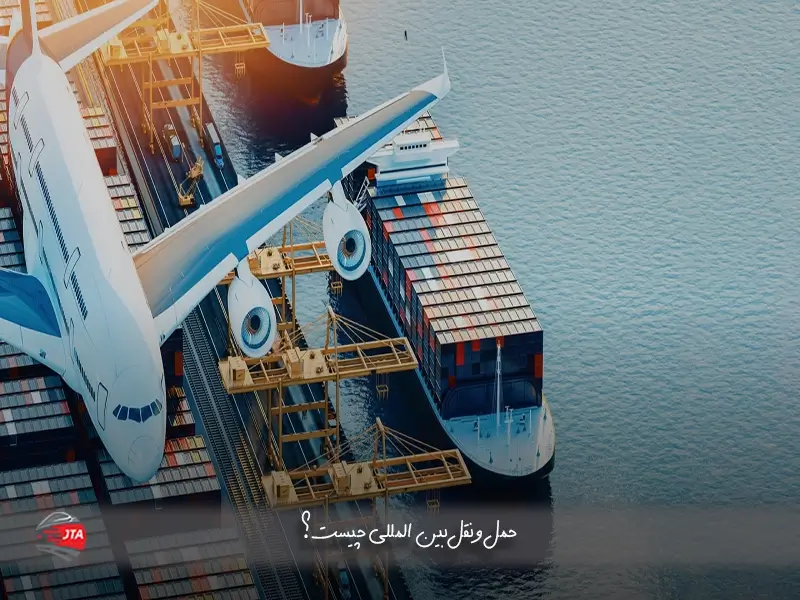International transport plays a key role in facilitating economic communication between countries as a cornerstone of global trade. This process involves the movement of goods, raw materials, and finished products from one country to another. At Jahan Tarabar Abrisham, all transportation-related services are provided. International transport not only contributes to the development of the global economy but also fosters cultural and social relationships between different nations. This article will examine the concept of international transport, its types, and the challenges and benefits
فهرست مطالب
ToggleWhat is international freight transport?
International freight transport refers to the process of moving goods and services from one country to another across international borders. This process includes all steps from packaging and loading to customs clearance and final delivery to the destination. International transport is essential for meeting the demands of local markets, boosting foreign trade, and facilitating the import and export of products.
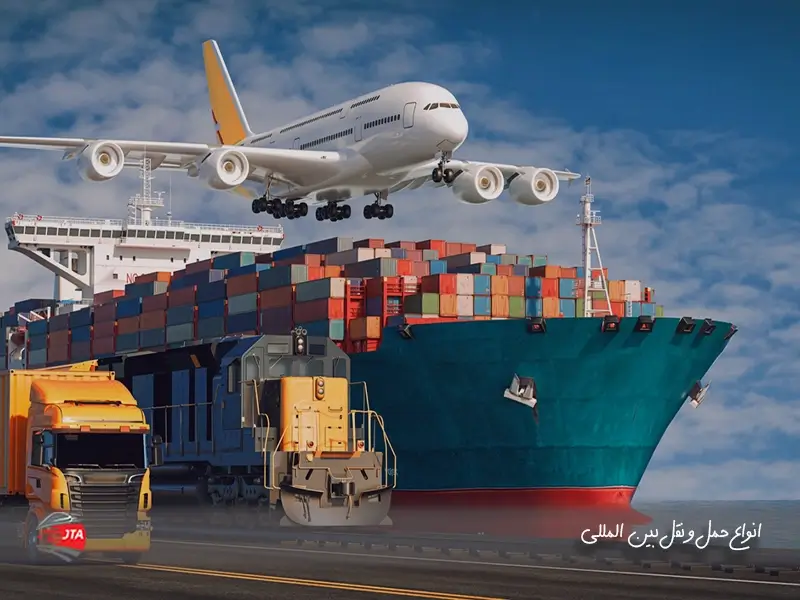
Types of International Transport Methods
International transport is carried out using four main methods: sea, air, land, and combined transport. Each method has its own advantages and specific applications, which are chosen based on factors such as the type of goods, delivery time, and required budget. Below is an overview of these methods and their unique characteristics.
Sea Freight Transport
Sea freight is one of the oldest and most commonly used methods for transporting goods internationally. It is ideal for shipping large volumes of heavy and bulky items such as raw materials, industrial machinery, and agricultural products. Cargo ships with very high capacities allow for the transport of large quantities of goods at a relatively lower cost compared to other transport methods. However, sea transport is slower due to long shipping routes and weather conditions, but it is the best option for goods that don’t require urgent delivery.
Air Freight Transport
Air transport is the fastest method for moving goods between countries and is used for goods requiring urgent delivery, such as perishable products, expensive electronics, and important documents. Due to its speed, air transport is more costly compared to sea and land transport. International airports serve as key hubs for air transport, with goods being shipped via cargo planes. Air transport is typically chosen for light and valuable goods due to weight and volume restrictions.
Land Freight Transport
Land transport involves the use of trucks and trains to move goods between neighboring countries or over short to medium distances. This method is particularly common in European and Asian regions with extensive road and rail networks. Land transport is more cost-effective than air transport and can handle a variety of goods, from small items to large shipments. It also offers more flexibility in route selection and scheduling, though it may be slower than air or sea transport.
International Rail Transport
Rail transport is an efficient and sustainable method for transporting goods over long distances, especially in countries with well-developed rail networks. Trains can carry large volumes of goods at a lower cost than road or air transport. This method is favored for its high safety, lower fuel consumption, and smaller environmental impact. Rail is particularly suitable for heavy and bulky items such as minerals, agricultural products, and raw materials, and can also be integrated into a combined transport chain. One limitation is its dependence on rail infrastructure and the need for transport stations at both the origin and destination.
Combined (Multimodal) Transport
Multimodal or combined transport is a method that uses a combination of two or more transport modes to move goods. This method optimizes routes and reduces costs, as it leverages the advantages of each transport mode (sea, air, land). For example, goods may be shipped by sea to a port and then transported by truck or rail to the final destination. Combined transport offers high flexibility in planning and logistics execution, improving delivery times and reducing costs compared to using a single mode of transport.
Importance of International Transport
International transport plays a crucial role in global trade as one of its foundational elements. It enables countries to access new markets and products, boosts economic development, and reduces reliance on domestic resources. Additionally, it fosters job creation, improves transport infrastructure, and promotes competition in global markets. By facilitating the exchange of goods across borders, international transport contributes to the overall integration of economies, enhancing global cooperation and trade growth.
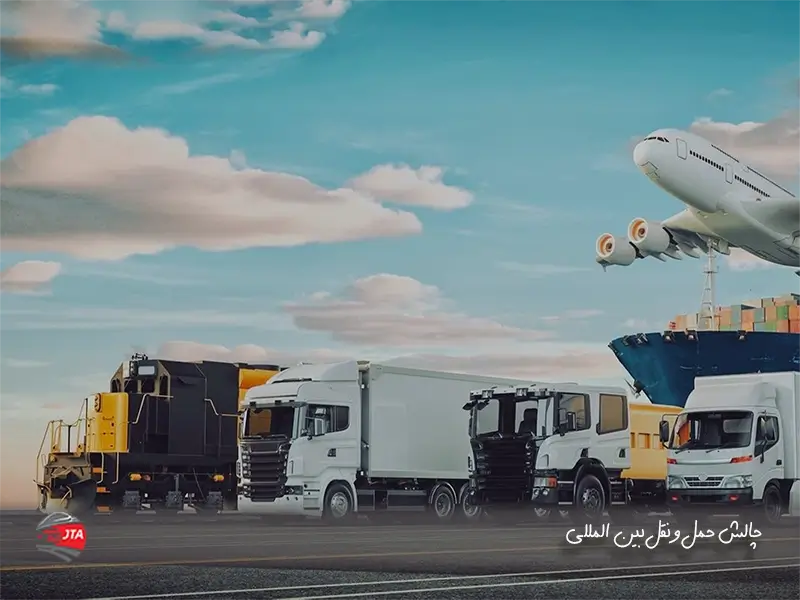
Challenges of International Freight Transport
International freight transport faces a range of challenges that can impact its efficiency and cost. Some of these challenges include:
- Customs and Tariffs: Varying customs regulations and tariffs between countries can complicate the transportation process and make it more expensive.
- Logistical Issues: Coordinating between carriers, transport companies, and customs can be time-consuming and difficult, often leading to delays.
- Security Risks: Issues such as theft, damage to goods, and political instability can threaten the security of international transportation.
- Environmental Impact: International transport can contribute to environmental pollution and greenhouse gas emissions, making it a significant concern in global trade.
- Use of Modern Technology: New technologies, such as online cargo tracking and supply chain management, can streamline processes and reduce issues by improving visibility and coordination.
- Choosing Reliable Transport Companies: Partnering with experienced, reputable transport companies can help mitigate risks and improve the reliability of international shipments.
The International Freight Transport Process
The international freight transport process involves several key steps to ensure that goods reach their final destination safely and efficiently. These steps include:
- Packaging and Preparing the Goods:
The first step is to properly package the goods to prevent damage during transit. For fragile or sensitive items, using robust and standardized packaging is essential to ensure their safety. - Preparing Required Documents:
Various documents are needed for international transport, such as the bill of lading, certificate of origin, and customs documents. These are crucial for clearing goods through customs and ensuring the legality of the transport process. - Choosing the Transport Method:
The choice of transport method (sea, air, land, or rail) depends on factors such as the type of goods, budget, and required delivery time. This decision must be made carefully, considering all aspects of the shipment. - Insurance and Security:
Insurance is an important step in the international transport process. It helps mitigate risks of potential damage during transit and ensures that compensation is provided if any issues arise, offering peace of mind during the journey.
Each of these steps plays a critical role in ensuring that international shipments are completed smoothly and efficiently.
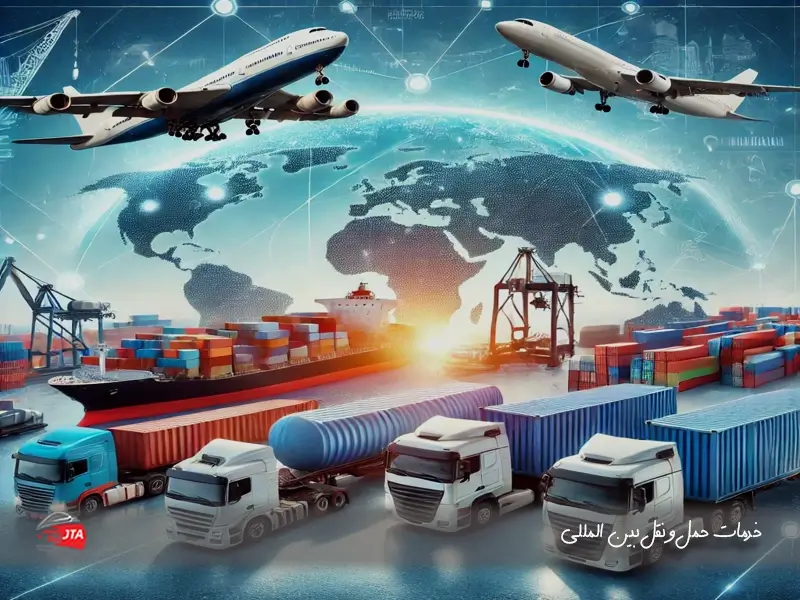
Benefits of International Freight Transport
In addition to the challenges, international freight transport offers numerous benefits that contribute to the growth of global trade. These advantages include:
- Access to Global Markets:
Countries can introduce their products to international markets, benefiting from a diverse range of goods and services, which can stimulate economic growth. - Cost Reduction:
International transport allows countries to source goods from regions with lower production costs, helping reduce the final prices of products and increasing overall efficiency in production. - Improved Quality of Life:
By having access to a wide variety of products and services from around the world, quality of life improves as consumers enjoy a broader selection of goods and better living standards. - Strengthened International Relations:
The movement of goods across borders helps build stronger economic, cultural, and political relationships between countries, fostering a more interconnected global community.
These advantages illustrate how international freight transport is integral not only to the economy but also to global cooperation and development.
Key Terms in International Freight Transport
In the world of international freight transport, there are numerous terms and concepts that professionals in the field must be familiar with. Some terms are used in maritime transport, others in air and ground transport, and some are specific to transport contracts. Here are some common terms:
Common Maritime Transport Terms:
- FOB (Free On Board): This term means that the seller is responsible for the transportation of goods until they are loaded onto the ship. After that, responsibility transfers to the buyer.
- CIF (Cost, Insurance, and Freight): In this case, the seller is responsible for the cost of shipping, insurance, and freight to the final destination.
Important Air Transport Terms:
- AWB (Air Waybill): This is the primary document in air transport, representing the contract of carriage between the sender and the air transport company.
- Chargeable Weight: This is the weight used to calculate shipping costs, and it may be based on either the actual weight or the volume of the goods.
These terms are crucial for understanding the logistics and responsibilities associated with international transport and the various stages of shipping, insurance, and delivery.
Common Terms in Ground Transport
- CMR (Convention on the Contract for the International Carriage of Goods by Road): This international convention governs the conditions for road transport of goods between countries.
- LTL (Less Than Truckload): This term refers to shipments that do not fill an entire truck and are transported alongside other shipments within the same vehicle.
- Logistics Management: This involves the planning and execution of all stages of transportation, including packaging, loading, transportation, unloading, and delivery of goods.
- Transport Equipment Sourcing: The process of selecting and leasing appropriate vehicles, such as ships, airplanes, trucks, or trains, based on the type of goods and destination.
- Customs Procedures: Facilitating customs processes and clearance for goods at both the origin and destination countries.
- Cargo Insurance: Providing necessary insurance to cover risks such as damage or loss of goods during transport.
- Consultation Services: Offering advice to clients on the best routes, methods, and schedules for transporting goods.
These terms play an essential role in ensuring the smooth, efficient, and secure transport of goods, especially in cross-border and international logistics.
what is an international transport company?
An international transport company is a commercial entity responsible for the transfer of goods and shipments from one country to another. These companies act as intermediaries between exporters and importers and manage all stages of transportation, from receiving goods at the origin to delivering them at the destination. International transport companies, due to the nature of their business, must be familiar with and comply with the laws and regulations of the countries of origin, destination, and the intermediate routes.
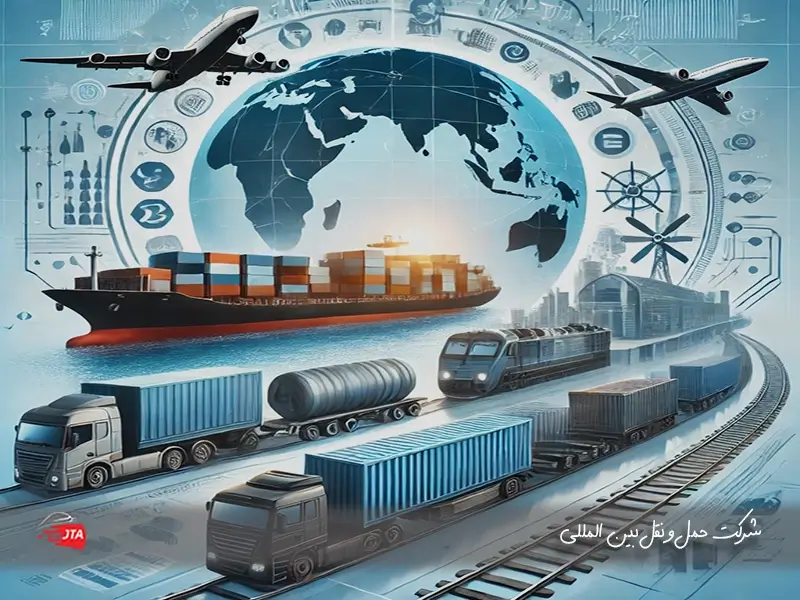
International transport companies offer a variety of services and responsibilities, including:
Documents Required for Registering an International Transport Company
Registering an international transport company requires submitting documents that demonstrate the company’s readiness and capabilities to operate in this field. These documents include legal, financial, accounting, and staff-related documents, as well as equipment records.
Legal and Regulatory Documents
- Company Articles of Association: A document that outlines the internal rules and regulations of the company and must be approved by the relevant legal authorities.
- Operating License: A license issued by government organizations to authorize the company to start its transportation activities.
Financial and Accounting Documents
- Tax Declaration: Documents reflecting the company’s financial status during a specific period.
- Financial Capability Certificate: A document that shows the company’s financial ability to conduct international transportation operations.
Staff and Equipment-Related Documents
- Training Certificates: Documents indicating the qualifications and training of the company’s personnel in the field of transportation.
- Ownership or Lease Certificates for Equipment: Documents proving ownership or leasing of the necessary transportation equipment.
Sample International Transport Contracts
International transport contracts are crucial as they define the terms and conditions under which goods will be transported between parties. Below are the key sections and points to consider when drafting such contracts:
Main Sections of a Transport Contract
- Definitions and Terms: The introductory section where all terms used throughout the contract are defined.
- Subject of the Contract: A detailed description of the goods and services to be transported.
- Obligations of the Parties: Clearly outlines the responsibilities and duties of both parties involved in the contract.
Terms and Conditions of the Contract
- Contract Duration: Specifies the time frame during which the transport must occur.
- Payment Terms: Details the payment method and schedule agreed upon by the buyer.
Negotiating and Drafting the Contract
- Price Negotiation: Discussion about transport costs and final pricing.
- Legal Considerations: Attention to relevant legal requirements and regulations governing international transport.
These sections help ensure clarity and minimize disputes during the transport process.
Summary
International transport is a vital component of the global supply chain, facilitating efficient and optimal international trade. The choice of transportation method—whether sea, air, land, rail, or even a combination—can significantly impact costs, delivery times, and the safety of goods. Each method has its own advantages and disadvantages, which should be carefully considered based on the type of goods, budget, and final destination.
Effective management of international transportation enhances efficiency, reduces costs, and increases customer satisfaction. Additionally, using a combination of transport methods allows businesses to leverage the strengths of each while managing geographic and infrastructure limitations.
World Traber Abrisham, with its comprehensive international transport services—including sea, air, land, rail, and combined transport—offers a seamless global goods movement experience. With its expertise and advanced technology, the company helps optimize transportation processes, reduce costs, and ensures timely and safe delivery of goods to their destinations.
Choosing the right transport method is a smart investment that contributes to the growth and development of your business. By relying on World Traber Abrisham’s services, you can trust that your shipments will reach their destination with the highest quality and in the shortest time possible.


